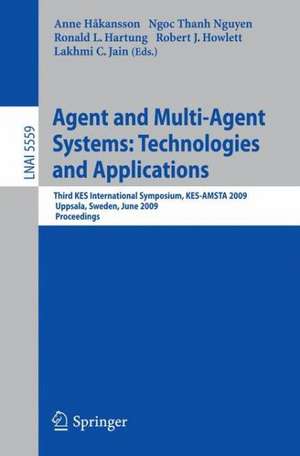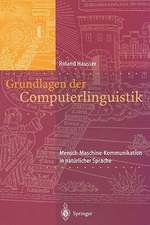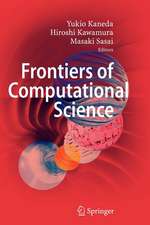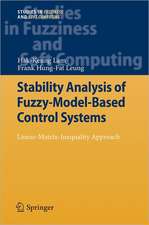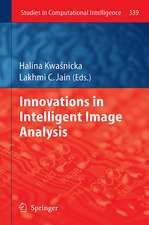Agent and Multi-Agent Systems: Technologies and Applications: Third KES International Symposium, KES-AMSTA 2009, Uppsala, Sweden, June 3-5, 2009, Proceedings: Lecture Notes in Computer Science, cartea 5559
Editat de Anne Hakansson, Ronald Hartungen Limba Engleză Paperback – 25 mai 2009
Din seria Lecture Notes in Computer Science
- 20%
 Preț: 1040.03 lei
Preț: 1040.03 lei - 20%
 Preț: 333.46 lei
Preț: 333.46 lei - 20%
 Preț: 335.08 lei
Preț: 335.08 lei - 20%
 Preț: 567.60 lei
Preț: 567.60 lei - 20%
 Preț: 238.01 lei
Preț: 238.01 lei - 15%
 Preț: 568.74 lei
Preț: 568.74 lei - 20%
 Preț: 333.46 lei
Preț: 333.46 lei - 20%
 Preț: 438.69 lei
Preț: 438.69 lei -
 Preț: 373.56 lei
Preț: 373.56 lei - 20%
 Preț: 336.71 lei
Preț: 336.71 lei - 20%
 Preț: 148.66 lei
Preț: 148.66 lei - 20%
 Preț: 310.26 lei
Preț: 310.26 lei - 20%
 Preț: 632.22 lei
Preț: 632.22 lei - 20%
 Preț: 747.79 lei
Preț: 747.79 lei - 20%
 Preț: 1053.45 lei
Preț: 1053.45 lei - 17%
 Preț: 427.22 lei
Preț: 427.22 lei - 20%
 Preț: 641.78 lei
Preț: 641.78 lei - 20%
 Preț: 307.71 lei
Preț: 307.71 lei - 20%
 Preț: 809.19 lei
Preț: 809.19 lei - 20%
 Preț: 579.56 lei
Preț: 579.56 lei - 20%
 Preț: 649.49 lei
Preț: 649.49 lei - 20%
 Preț: 330.23 lei
Preț: 330.23 lei -
 Preț: 389.48 lei
Preț: 389.48 lei - 20%
 Preț: 607.39 lei
Preț: 607.39 lei - 20%
 Preț: 538.29 lei
Preț: 538.29 lei - 20%
 Preț: 1003.66 lei
Preț: 1003.66 lei - 20%
 Preț: 326.98 lei
Preț: 326.98 lei - 20%
 Preț: 256.27 lei
Preț: 256.27 lei - 20%
 Preț: 444.17 lei
Preț: 444.17 lei - 20%
 Preț: 571.63 lei
Preț: 571.63 lei - 20%
 Preț: 575.48 lei
Preț: 575.48 lei - 20%
 Preț: 574.05 lei
Preț: 574.05 lei - 17%
 Preț: 360.19 lei
Preț: 360.19 lei - 20%
 Preț: 504.57 lei
Preț: 504.57 lei - 20%
 Preț: 172.69 lei
Preț: 172.69 lei - 20%
 Preț: 369.12 lei
Preț: 369.12 lei - 20%
 Preț: 346.40 lei
Preț: 346.40 lei - 20%
 Preț: 747.79 lei
Preț: 747.79 lei -
 Preț: 402.62 lei
Preț: 402.62 lei - 20%
 Preț: 584.40 lei
Preț: 584.40 lei - 20%
 Preț: 569.19 lei
Preț: 569.19 lei - 20%
 Preț: 1159.14 lei
Preț: 1159.14 lei - 20%
 Preț: 1386.07 lei
Preț: 1386.07 lei - 20%
 Preț: 343.16 lei
Preț: 343.16 lei - 20%
 Preț: 309.90 lei
Preț: 309.90 lei - 20%
 Preț: 122.89 lei
Preț: 122.89 lei
Preț: 633.72 lei
Preț vechi: 792.15 lei
-20% Nou
Puncte Express: 951
Preț estimativ în valută:
121.29€ • 127.25$ • 100.62£
121.29€ • 127.25$ • 100.62£
Carte tipărită la comandă
Livrare economică 29 ianuarie-12 februarie 25
Preluare comenzi: 021 569.72.76
Specificații
ISBN-13: 9783642016646
ISBN-10: 3642016642
Pagini: 888
Ilustrații: XX, 865 p.
Dimensiuni: 155 x 235 x 47 mm
Greutate: 0.45 kg
Ediția:2009
Editura: Springer Berlin, Heidelberg
Colecția Springer
Seriile Lecture Notes in Computer Science, Lecture Notes in Artificial Intelligence
Locul publicării:Berlin, Heidelberg, Germany
ISBN-10: 3642016642
Pagini: 888
Ilustrații: XX, 865 p.
Dimensiuni: 155 x 235 x 47 mm
Greutate: 0.45 kg
Ediția:2009
Editura: Springer Berlin, Heidelberg
Colecția Springer
Seriile Lecture Notes in Computer Science, Lecture Notes in Artificial Intelligence
Locul publicării:Berlin, Heidelberg, Germany
Public țintă
ResearchCuprins
Social and Organizational Structures of Agents.- Negotiation Protocols.- Mobile Agents and Robots.- Agent Design and Implementation.- E-Commerce.- Simulation Systems and Game Systems.- Agent Systems and Ontologies.- Agents for Network Systems.- Communication and Agent Learning System.- Web Services and Semantic Web.- Self-Organization in Multi-Agent Systems.- Management and eBusiness.- Mobile and Intelligent Agents for Networks and Services.- Engineering Interaction Protocols.- Agent-Based Simulation, Decision Making and Systems Optimization.- Digital Economy.- Agent-Based Optimization (ABO2009).- Distributed Systems and Artificial Intelligence Applications.
Textul de pe ultima copertă
This book constitutes the proceedings of the Third International Symposium on Agent and Multi-Agent Systems: Technologies and Applications, held in Uppsala, Sweden, during June 3-5, 2009.
The 86 papers contained in this volume were carefully reviewed and selected from numerous submissions. There are 13 main tracks covering the methodology and applications of agent and multi-agent systems and 8 special sessions on specific topics within the field.
The papers are divided in topical sections on social and organizational structures of agents; negotiation protocols; mobile agents and robots; agent design and implementation; e-commerce; simulation systems and game systems; agent systems and ontologies; agents for network systems; communication and agent learning systems; Web services and semantic Web; self-organization in multi-agent systems; management and e-business; mobile and intelligent agents for networks and services; engineering interaction protocols; agent-based simulation, decision making and systems optimization; digital economy; agent-based optimization (ABO2009); distributed systems and artificial intelligence applications.
The 86 papers contained in this volume were carefully reviewed and selected from numerous submissions. There are 13 main tracks covering the methodology and applications of agent and multi-agent systems and 8 special sessions on specific topics within the field.
The papers are divided in topical sections on social and organizational structures of agents; negotiation protocols; mobile agents and robots; agent design and implementation; e-commerce; simulation systems and game systems; agent systems and ontologies; agents for network systems; communication and agent learning systems; Web services and semantic Web; self-organization in multi-agent systems; management and e-business; mobile and intelligent agents for networks and services; engineering interaction protocols; agent-based simulation, decision making and systems optimization; digital economy; agent-based optimization (ABO2009); distributed systems and artificial intelligence applications.
